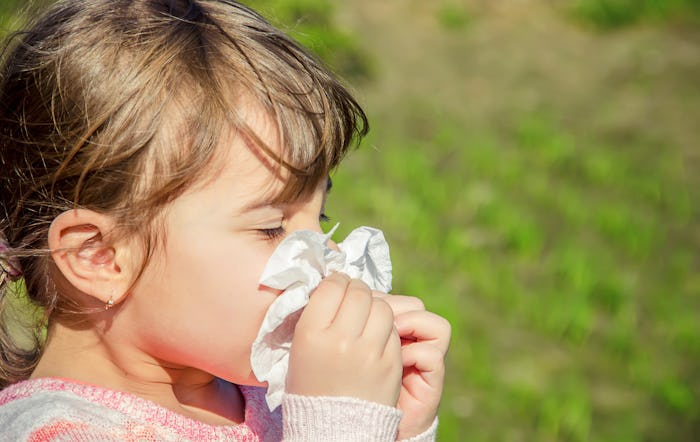Some people don't need to be told when pollen season is. Their itchy eyes and runny noses let them know instantly. Of course, the yellow coating of dust-like material on your car gives it away, too. Allergies can be relentless and even the best planning can't always prevent your child from reacting to the pollen and other allergens in the air. However, it is helpful to know when is pollen season? Since preparation is the name of the parenting game, it definitely won't hurt.
While the bulk of the pollen is found in the spring, pollen can be produced year round, according to the website, Pollen. There are many different types of pollen, including grass, tree, and ragweed, and they can sprinkle their evil power at different times. Tree pollen might trigger symptoms in the late winter or early spring, according to WebMD, while ragweed releases pollen in the summer and fall. As the website Pollen described it, pollen production is the way for plants to reproduce and they produce it in gigantic quantities. This fine powder gets blown all over and, unfortunately, some of it lands on and gets into our skin, eyes, mouths, and lungs. If you have allergies, your body treats the pollen like an invader and over-mobilizes its antibodies to attack it. Hence, the sneezing, wheezing, and teary eyes that come with allergies.
What can you do about this? Turns out, technology is your friend on this one. There are several websites and apps to help you anticipate high pollen days, including The Weather Channel's "Allergy Tracker" and My Pollen Forecast - Allergies. When using these apps, you know which days you need to pay more attention to allergies. When you know it'll be a high pollen day you can either medicate in anticipation, or you can try to just stay indoors. That's not always easy if you have a little kid who needs his run around time outside. It's also hard if your child is in school. You can work with your child's teacher to find the best solution. Some kids can play outside with mild effects, some might need to be on allergy medicine, and still others may need to remain indoors. If your child does play outside, it might be helpful to wash their hands thoroughly and change their clothes when they come home. On super high pollen days, you might want to give them a quick bath or shower to get the pollen out of their hair, too. Air conditioners in the home can be really helpful, especially as it allows you to keep your windows closed and seal off your house or apartment.
Talk to your pediatrician about the different types of medication available. Some kids do well with over-the-counter medication (antihistamines like Claritin, Zyrtec, and Allegra) and others may need prescription medication, RxList described. Sometimes the child will have success with a steroid nasal spray, such as Flonase or Nasacort, according to the American Academy of Pediatrics (AAP). This reduces inflammation in the nasal cavity and can be very effective. Steroids also come in cream, liquid, and pill form and can be used in asthma inhalers.
If you have the time and are willing to make the commitment, the AAP suggests allergy immunotherapy, or what we used to call "allergy shots." Immunotherapy exposes the child to the thing they are allergic to, in hopes that their system will build up natural immunity to it. It's not a quick and easy fix. You need to start well before pollen season and it's very time consuming. At the beginning, you may need to be at the doctor's office twice a week, then later it'll go to every two weeks, every three weeks, etc. As the treatment continues, the amount of allergen in the shot gets greater and hopefully by the end of six to 12 months, your child feels better. After doing this for a few years, they may even get total relief from their symptoms.
Both the Centers For Disease Control and Prevention (CDC) and the Environmental Protection Agency (EPA) have reported that because of climate change, pollen season is getting longer. This is due to global warming and the delay in the fall of the first frost. The EPA reported the higher in latitude you go, the longer the pollen season is, so the cities in Canada saw a greater increase in their pollen season length than the cities in the United States.
Unfortunately, as Vox explained, with more pollen being produced there are more plants the following year that will create even more pollen. This will continue again and again until it feels like pollen is taking over the world. Until then, get your allergy medicine ready and crank your air conditioners.
Check out Romper's new video series, Bearing The Motherload, where disagreeing parents from different sides of an issue sit down with a mediator and talk about how to support (and not judge) each other’s parenting perspectives. New episodes air Mondays on Facebook.
